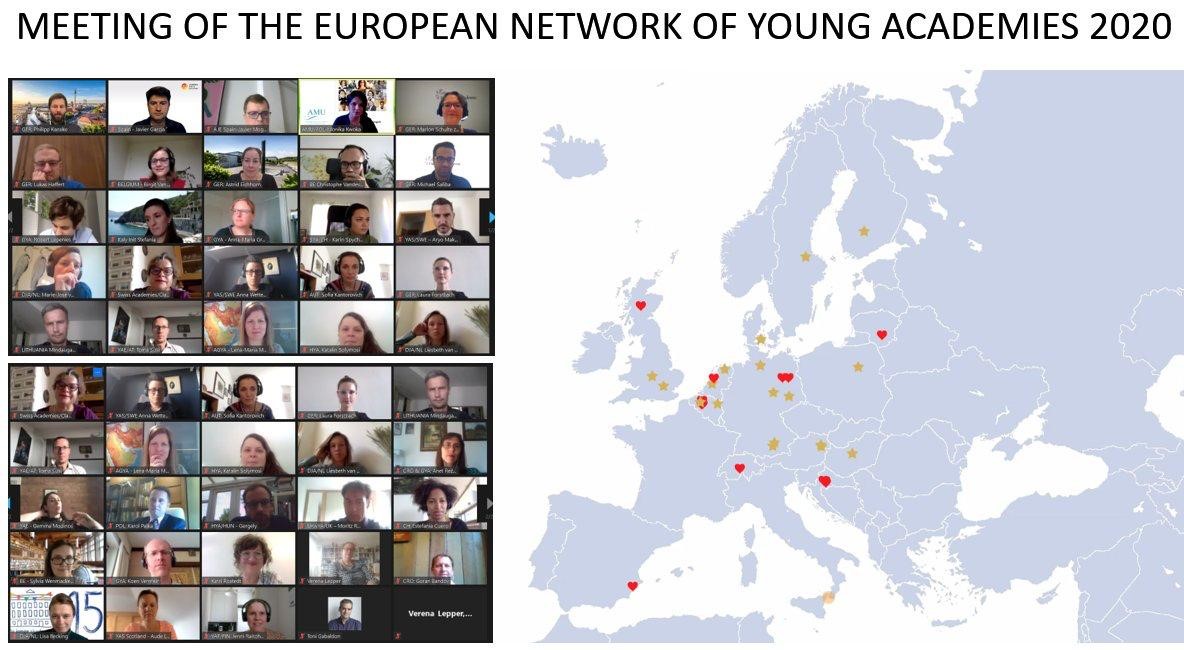Young Academies from all over Europe met online on 4-5 July 2020. The meeting was hosted by the Junge Akademie (Germany), who are celebrating their 20th anniversary this year. The online meeting saw the highest number of participation ever, bringing together representatives from 22 young academies and academy initiatives. The GYA was represented by Immediate Past Co-Chair Koen Vermeir (CNRS, France), and EC member Robert Lepenies (Helmholtz Centre for Environmental Research, Germany), as well as GYA Project Officer Anna-Maria Gramatté.
Several more GYA members participated wearing their respective young academy hats: GYA Co-Chair Michael Saliba for the Junge Akademie, members Gergely Toldi for the Hungarian Young Academy, Stefania Mondello for the Italian initiative, Anet Režek Jambrek and Goran Bandov for the Croatian initiative, and alumni Javier García Martínez, Javier Martínez Moguerza, and Toni Gabaldón for the Young Academy of Spain, alumna Verena Lepper for the Arab-German Young Academy, and alumnus Moritz Riede for the UK NYA initiative.
Participants continued discussions from last year’s meeting in Helsinki, looked into young academies’ best practices, and discussed the role of young academies and early-career researchers in science communication and science-based policy advice.
The Young Academy Finland briefly presented their Young Researchers as Knowledge Brokers project, which gathers information from European young academies on their science-policy interface activities.
This was followed by a round-table discussion on “Science communication and policy advice” with guest speakers Jutta Allmendinger, President of the WZB Berlin Social Science Center, and Reinhard Bütikofer, Member of the European Parliament (Greens/EFA). In an inspiring exchange of experiences and ideas, they discussed the demand from policy-makers for science advice, as well as pathways into the science-policy arena for young scientists and academies in particular, and the limitations of providing science advice. They agreed that policy-makers need to receive science-based advice and that science has an intrinsic motivation to share knowledge with politicians. However, engaging in science advice often does not add to a scientist’s reputation and exposes them personally. In order to provide science advice, young academies should self-organise and connect transnationally and multi-sectorally.
A session with the President of All European Academies (ALLEA), Antonio Loprieno, provided valuable insights into the current work of this European academies network, and the role that young academies could play within the network. The Junge Akademie recently joined ALLEA, to better engage with academies within Europe and to work on topics that go beyond a national audience.
A central item on the agenda was the potential inclusion of ECRs and young academies in the science advice structures on the European level. Rudolf Hielscher, Coordination Team Chair at SAPEA, introduced this Science Advice for Policy by European Academies consortium and discussed the potential role of Young Academies in SAPEA. This was followed by discussions among the young academy representatives about a potential Young Academies Science Advice Structure (YASAS). The majority of participants expressed their intent to continue developing this in coming months.
The latest additions to the young academies network – the Swiss Young Academy and the Romanian Young Academy – were also represented at the meeting. Representatives from the young academy initiatives from Croatia, Italy, Latvia and the UK also attended to learn about existing young academy models and structures, areas of young academy engagement and possible cooperation.
The European Young Academies will meet again – hopefully in person – in Edinburgh, UK, in 2021, when the Young Academy of Scotland will host the meeting.
